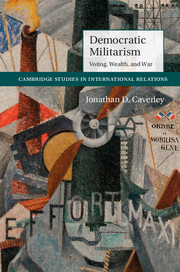Book contents
- Frontmatter
- Dedication
- Contents
- List of figures
- List of tables
- Acknowledgments
- 1 Introduction: sources of democratic military aggression
- 2 Cost distribution and aggressive grand strategy
- 3 Analyses of public opinion
- 4 Analyses of arming and war
- 5 British electoral reform and imperial overstretch
- 6 Vietnam and the American way of small war
- 7 Becoming a normal democracy: Israel
- 8 Conclusion: strategy wears a dollar sign
- Bibliography
- Index
7 - Becoming a normal democracy: Israel
Published online by Cambridge University Press: 05 July 2014
- Frontmatter
- Dedication
- Contents
- List of figures
- List of tables
- Acknowledgments
- 1 Introduction: sources of democratic military aggression
- 2 Cost distribution and aggressive grand strategy
- 3 Analyses of public opinion
- 4 Analyses of arming and war
- 5 British electoral reform and imperial overstretch
- 6 Vietnam and the American way of small war
- 7 Becoming a normal democracy: Israel
- 8 Conclusion: strategy wears a dollar sign
- Bibliography
- Index
Summary
What are the consequences for Israel's security of the many changes occurring in its society, its threat spectrum, and its military doctrine? How did these changes contribute to the flawed reconciliation of Israel's strategic ends and means in its fight against Hezbollah during the Second Lebanon War of 2006? What can we learn about the democratic way of war from Israel's recent experience?
Students of democratic grand strategy and civil-military relations often treat Israel as an exceptional case because of its sizable military, compulsory draft, reliance on reserves, strong war industry, and largely military-based national culture (Peri, 2006, 22). Israel is, however, undergoing profound and related shifts in its society, politics, and military. These shifts appear to draw it closer in line with other developed and well-established democracies due to reductions in threat levels, increases in liberalism and economic inequality among its citizens, and an increasingly professionalized military (Bar-Joseph, 2001).
Since the Cold War's end, Israel's perceived security problems have changed, even as many other democracies such as the United States have focused on threats – terrorism and missiles – that more closely resemble Israel's. The traditional fear of a conventional attack on Israel's “wasp-waisted” mid-section has largely disappeared. On the other hand, Israel faces ballistic missile threats from neighboring state and non-state actors, and a potentially nuclear Iran in the future. It has experienced sporadic terrorism, rocket fire, and insurgency from the occupied Palestinian territories.
- Type
- Chapter
- Information
- Democratic MilitarismVoting, Wealth, and War, pp. 210 - 253Publisher: Cambridge University PressPrint publication year: 2014



